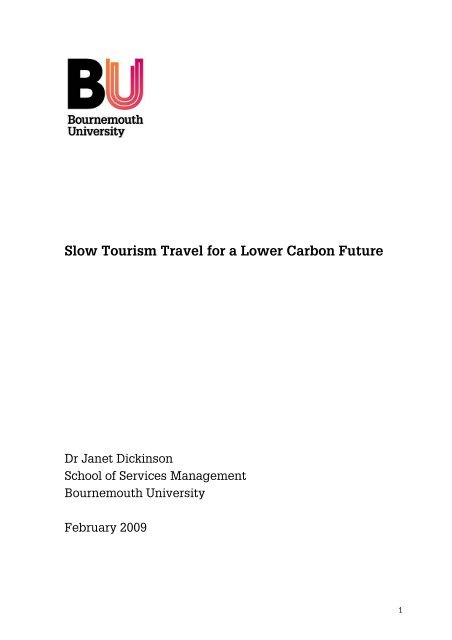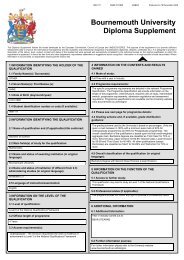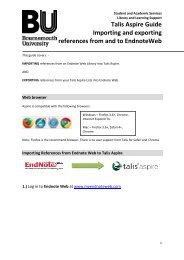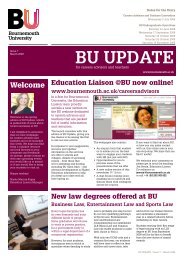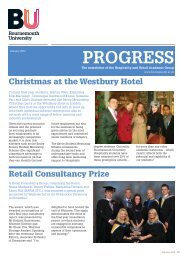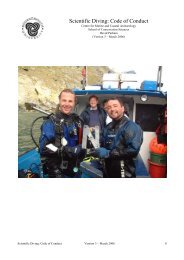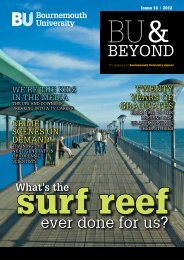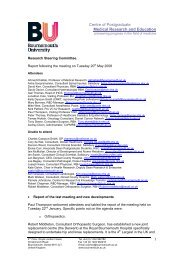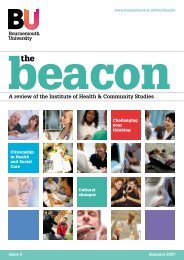Slow Tourism Travel for a Lower Carbon Future - Bournemouth ...
Slow Tourism Travel for a Lower Carbon Future - Bournemouth ...
Slow Tourism Travel for a Lower Carbon Future - Bournemouth ...
Create successful ePaper yourself
Turn your PDF publications into a flip-book with our unique Google optimized e-Paper software.
<strong>Slow</strong> <strong>Tourism</strong> <strong>Travel</strong> <strong>for</strong> a <strong>Lower</strong> <strong>Carbon</strong> <strong>Future</strong><br />
Dr Janet Dickinson<br />
School of Services Management<br />
<strong>Bournemouth</strong> University<br />
February 2009<br />
1
Introduction<br />
What role does climate change play in holiday travel decisions? How can we<br />
encourage more sustainable holiday travel? Is slow travel a realistic<br />
alternative and what might encourage people to choose slow travel?<br />
These are just some of the questions that provided the rationale <strong>for</strong><br />
undertaking research into slow travel. <strong>Slow</strong> travel or slow tourism has been<br />
one response of the tourism industry to climate change concerns. It has<br />
featured in the media as an alternative to air travel and there is also a<br />
growing slow travel movement which encourages people to travel to<br />
destinations more slowly overland, holiday in one place, stay longer and travel<br />
less. In recognition of the need to investigate this topic, the Royal<br />
Geographical Society (with the Institute of British Geographers) has<br />
supported this study. The research sought to explore the opportunities<br />
presented by slow travel <strong>for</strong> a lower carbon future.<br />
The Research<br />
The research aim was to explore how established international tourism travel<br />
practices, with high greenhouse gas emissions, might be adapted to<br />
alternative ways of thinking about holidays in the future when we will have to<br />
use less fossil fuels.<br />
The following working definition was proposed <strong>for</strong> slow travel:<br />
Holiday travel involving shorter trips (distance) and longer stays<br />
(time) where air transport is rejected in favour of less<br />
environmentally damaging <strong>for</strong>ms of overland transport which<br />
become incorporated as part of the holiday experience.<br />
The study sought the views of both mainstream and slow travellers and<br />
focused on the way people talk about their holiday travel. Between June and<br />
October 2008, in-depth interviews were conducted be<strong>for</strong>e and, in most cases,<br />
after a European holiday with 16 participants (including some pairs of<br />
participants). Following the first interview, materials on the participant’s<br />
destination and potential <strong>for</strong> alternative travel options was compiled and an<br />
estimate made of the relative carbon footprint of the various options. The<br />
second interview focused on the actual travel experience, presented<br />
participants with in<strong>for</strong>mation about their carbon footprint and discussed the<br />
potential <strong>for</strong> use of alternative modes of transport. The analysis was focused<br />
on how people talk about holiday travel and how this enables or constrains<br />
what people do.<br />
2
The Findings<br />
The research explored five areas:<br />
• what slow travel means to people<br />
• the stories about mainstream and slow travel, how these stories are<br />
used, and how they enable or constrain holiday travel choices<br />
• the effect holiday travel choices have on our image of ourselves and<br />
how others see us<br />
• peoples’ explanation of travel behaviour in relation to their<br />
•<br />
understanding of climate change<br />
the opportunities presented by slow travel and the barriers <strong>for</strong> adoption<br />
of more carbon efficient travel<br />
1. <strong>Slow</strong> travel<br />
<strong>Slow</strong> travel is far from a clear concept and was interpreted by participants in a<br />
variety of different ways. It was not necessarily interpreted as a <strong>for</strong>m of<br />
holiday travel with low environmental impact, although this was an added<br />
bonus. While this is not a problem <strong>for</strong> the concept to provide a useful,<br />
alternative way of thinking about holidays, there are interpretations that are<br />
less than optimal <strong>for</strong> reducing the carbon footprint of tourism (<strong>for</strong> example,<br />
using air or car to access cycling holiday destinations). Participants’ slow<br />
travel included: cycling holidays in France; train trips to Italy, Germany and<br />
France; and coach trips to Italy.<br />
2. Holiday travel stories<br />
When people talk about their holiday travel they often talk in a way that<br />
improves their own credibility by emphasizing the positive side of their own<br />
travel choices and criticizing others. There are many positive ways of talking<br />
about slow travel, such as the special engagement with people and places,<br />
and there is potential to develop new stories about holiday travel which guide<br />
people to more sustainable practices. Conversely there are ways of talking<br />
about holiday travel that maintain unsustainable practice, such as the<br />
strength of the argument <strong>for</strong> flying; however, this can be challenged by strong<br />
negative perspectives about flying.<br />
3. <strong>Travel</strong> identity<br />
It is not clear to what extent identity plays a role in travel decisions.<br />
Participants were found to engage in distinct travel practices (<strong>for</strong> example,<br />
train holidays) that were largely context specific but, as individuals, they<br />
frequently engaged in a diverse range of travel practices in different contexts<br />
(<strong>for</strong> example, a cyclist might fly to the Mediterranean on another holiday).<br />
3
People there<strong>for</strong>e switch modes of transport depending on what they are<br />
trying to achieve. However, most slow travellers showed a strong<br />
commitment to their cycle, coach or train holidays while this commitment was<br />
less apparent <strong>for</strong> air and car travellers.<br />
4. Explanations of travel behaviour in relation to climate change<br />
In relation to climate change, it is evident that people, while concerned, are<br />
largely taking no action to amend their holiday travel plans. While<br />
participants understood some key climate change issues it was unclear how<br />
this knowledge was related to holiday travel. Participants used powerful<br />
arguments that excused individual responsibility and delegated it to others<br />
(<strong>for</strong> example, government or tourism industry). Two main themes were<br />
apparent: the power to act; and ambivalence. The <strong>for</strong>mer included reflections<br />
on ‘politics preventing progress’ and ‘scientific scepticism’ which provide a<br />
good defence strategy <strong>for</strong> taking no action. Similarly, under the ambivalence<br />
theme, expressing green credentials (<strong>for</strong> example, discussing recycling) was a<br />
common mechanism to displace responsibility. Together these provide useful<br />
strategies <strong>for</strong> taking no meaningful action.<br />
5. Opportunities presented by slow travel and barriers <strong>for</strong> adoption of more<br />
carbon efficient travel<br />
The potential of slow travel, while of interest to participants, is currently far<br />
from popular. This is because, to a large extent, many destinations and<br />
holiday practices currently require engagement with specific travel<br />
mechanisms (<strong>for</strong> example, it can be difficult to book many holiday packages<br />
without taking a flight). Pervasive arguments about holiday travel together<br />
with existing holiday and travel structures suggest a radical rethink of holiday<br />
travel practice is needed. This requires industry engagement. Key messages<br />
about slow travel, to be useful, need to be influential early in the holiday<br />
decision making process prior to key decisions being taken. There is a need<br />
<strong>for</strong> political action and clear scientific messages to raise public awareness of<br />
climate change. People are concerned, but uncertain, and there is currently<br />
too much scope <strong>for</strong> prevarication. There<strong>for</strong>e a final recommendation is the<br />
need to develop a solid scientific understanding of the relative environmental<br />
impacts of different holiday practices to in<strong>for</strong>m policy, practice and the public.<br />
The study has provided a foundation <strong>for</strong> further work on the concept of slow<br />
travel. The analysis is ongoing and further details will emerge in journal<br />
publications at a later date.<br />
4
The Author<br />
Dr Janet Dickinson is a Senior Lecturer in <strong>Tourism</strong> and Leisure Management<br />
based in the International Centre <strong>for</strong> <strong>Tourism</strong> and Hospitality Research,<br />
School of Services Management, <strong>Bournemouth</strong> University, UK. Her research<br />
interests, publications and conference papers are in the areas of sustainable<br />
tourism and transport, particularly tourism and climate change. Most recently<br />
her work has focused on how holiday travel practices are influenced by<br />
society, experiences and expectations of travel in order to analyse the<br />
potential <strong>for</strong> less energy intensive holidays in the context of climate change.<br />
This includes developing the slow travel concept.<br />
Contact Us<br />
Further in<strong>for</strong>mation on the <strong>Slow</strong> <strong>Tourism</strong> <strong>Travel</strong> <strong>for</strong> a <strong>Lower</strong> <strong>Carbon</strong> <strong>Future</strong><br />
study is available on http://www.bournemouth.ac.uk/icthr/slowtravel.html<br />
Details of other research conducted with the School of Services Management<br />
can be found on www.bournemouth.ac.uk<br />
The author can be contacted directly at:<br />
Dr Janet Dickinson: jdickinson@bournemouth.ac.uk<br />
5


